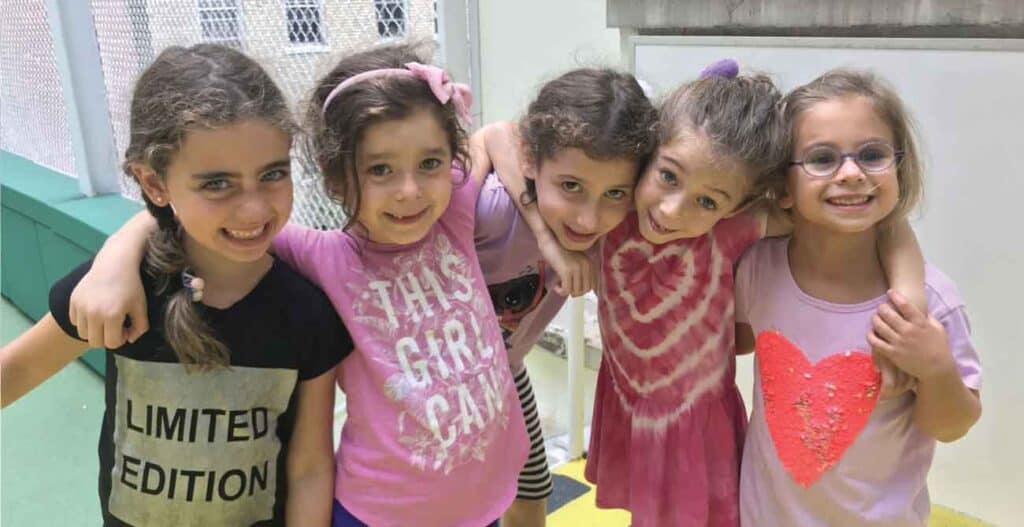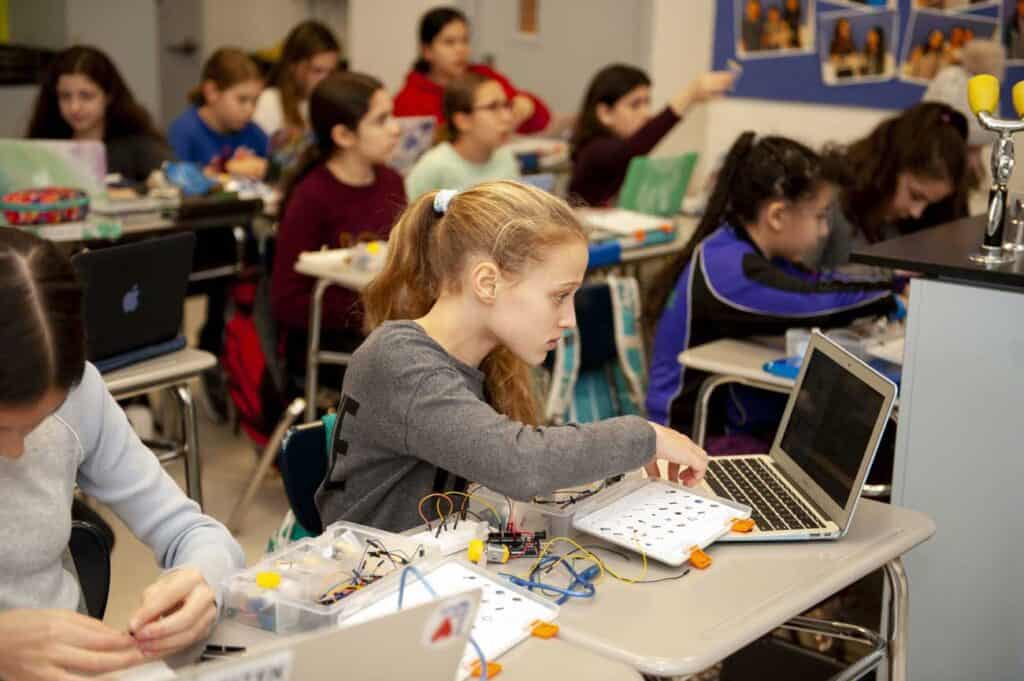
Academics
Rodeph Sholom School lives its mission to develop each student’s love of learning and sense of responsibility to themselves and others in the community by implementing a dynamic curriculum in Nursery through 8th Grade that consists meaningful experiences, tight knit connections, and intellectual explorations.
space white
Rodeph Sholom School offers students in Early Childhood through 8th Grade a stimulating academic program led by experienced and passionate faculty.
space white
Our core academic subjects are offered alongside a wide range of co-curricular and extracurricular opportunities. We challenge our students, while supporting each child’s cognitive and social-emotional growth.

Early Childhood Division
Rodeph Sholom School’s Early Childhood program stands on its own as one of the premier offerings in New York City. Housed in a dedicated building on West 84th Street, the program boasts a talented faculty of professional educators, play spaces that are designed specifically for young learners, a library, an art facility, and specialty teachers who enhance the experience.
Curriculum Overview
Twos
Nursery classroom experiences provide students with a sense of comfort and competence. Teachers visit students at their homes before school begins. Children then phase into school gradually, attending in small groups and on a limited schedule initially. This process allows students to feel more secure about separating from familiar adults so they can do so successfully. Teachers create predictable classroom routines and schedules and can move easily through the daily schedule.
Distinct learning areas set up in the classroom allow children to see the choices available to them. The arrangement and storage of classroom materials help students choose activities throughout the day. Teachers work with students to develop the skills they need to be more independent in the comfort of a school setting. Simple skills, such as putting on their coats, washing hands, pouring juice, and throwing away trash, enable children to take increased responsibility for themselves.
Threes
Nursery classroom experiences provide students with a sense of comfort and competence. Teachers visit students at their homes before school begins. Children then phase into school gradually, attending in small groups and on a limited schedule initially. This process allows students to feel more secure about separating from familiar adults so they can do so successfully. Teachers create predictable classroom routines and schedules and can move easily through the daily schedule. Distinct learning areas set up in the classroom allow children to see the choices available to them. The arrangement and storage of classroom materials encourage students to choose activities throughout the day. Teachers work with students to develop the skills they need to be more independent in the comfort of a school setting. Simple skills, such as putting on their coats, washing hands, pouring juice, and throwing away trash, enable children to take increased responsibility for themselves.
Pre-k
The structure of the Pre-Kindergarten day offers students gentle guidance in developing their relationships with others. Children develop self-confidence and independence as they separate from their caregivers. Each morning, students initiate social play through learning and work centers where children select what and with whom they will play. Their interactions with adults and peers grow positively as they learn to modulate their words to communicate wants, needs, or ideas. During the year, children learn to recognize themselves as part of a group. Pre-Kindergarteners follow well-established class routines and learn the boundaries of classroom life. They internalize school rules, learn to play safely, share, compromise with others, develop leadership skills, and enjoy independence within a supportive classroom and school environment.
Kindergarten
Kindergarten students begin the year familiarizing themselves with each other, their new classroom, and their many new teachers by participating in cooperative activities. As the year progresses students focus on creating a classroom community where the members support each other through encouraging words and negotiate conflicts peaceably. Modeling and role-playing activities aid in the development of a classroom conscience. Children learn to demonstrate confidence, value friendship, work cooperatively in small groups, develop leadership skills, and enjoy independence with the support of the classroom and school environment.

Elementary Division
Our 1st – 4th Grade students enter our doors every day eager to learn, play, and contribute to their community. Elementary students at Rodeph Sholom School grow and learn in a safe, nurturing, and developmentally appropriate environment where they build confidence, competence, and self-esteem. Our enthusiastic and highly-trained teachers actively engage students in the learning process, and together they explore new ideas and expand their understanding of the world around them.
Curriculum Overview
1st Grade
First Grade focuses on building students’ skills, particularly in literacy and math. Engaging activities allow students to develop these skills at a developmentally appropriate pace. The school’s Judaic ethos is an integral part of community building in the classroom.
2nd Grade
2nd Grade focuses on solidifying concepts and skills learned in previous grades. Within this review, students can extend their understanding by investigating each discipline using a specific, individualized approach. These disciplines are integrated as much as possible within an overall theme of New York City.
3rd Grade
3rd Grade serves as a transitional year as students progress from the development of basic skills to applying these skills in various content areas. The integration of content across several disciplines continues as students complete an increasing number of long-term projects. Highlights of 3rd Grade include mock Ellis Island and the Invention Fair.
4th Grade
During 4th Grade, students not only strengthen their skills in reading, writing, and mathematics but they also learn to use their skills across the curriculum as independent learners. Over the year, students complete long-term projects that prepare them for the work of Middle School. Each year, students analyze a Jewish Studies theme and create and perform the culminating musical “Midrash Hour.”

Middle School
Rodeph Sholom Middle School offers a unique middle school environment where learning is prized, teachers are specialists in both their subject disciplines and the developmental needs of adolescents, and Reform Jewish values form the foundation of learning in and outside of the classroom. The division is comprised of 5th through 8th Grade.
The stimulating curriculum recognizes that middle school is a transformative time of intellectual, emotional, and spiritual development. The Jewish ethos of our community provides a firm grounding in the ethics and values which are essential traits of active and responsible citizens. Over their Middle School years, students encounter many authentic leadership opportunities. At its core, the Middle School is designed to provide students with the tools necessary to learn how to evaluate themselves and the world around them. The heart of the Middle School experience is the advisory program.
Curriculum Overview
5th Grade
Pinnacle Trip: Frost Valley – Coming Soon
In the 5th Grade, advisors focus on the needs of students in this liminal year and aid in the transition from elementary to middle school. In this transitional year, students are supported in developing their study skills, and becoming more independent and organized, while beginning to practice self-advocacy. This support is given to the students through the advisory program, and in the 5th grade Seminar class. 5th graders regularly come together as a community to discuss and practice important early adolescent issues.
6th Grade
Pinnacle Trip: Washington DC – Coming Soon
The heart of the Middle School experience is the advisory program. Beginning in 6th Grade, advisors move up with their advisees through graduation. An important feature of the program is the active participation of students in their own academic and social-emotional development. Over three years and daily meetings, a deep and enduring relationship forms between advisor and advisee. This relationship transcends the usual teacher-student relationship and often forms a bond that continues past a student’s graduation.
7th Grade
Pinnacle Trip: American South – Coming Soon
The heart of the Middle School experience is the advisory program. Beginning in 6th Grade, advisors move up with their advisees through graduation. By 7th Grade, students know their advisors well and have developed a central relationship. The 7th Grade year is filled with B’nai Mitzvah, the Philanthropy Project, and increasing academic rigor.
8th Grade
Pinnacle Trip: Israel – Coming Soon
The heart of the Middle School experience is the advisory program. Beginning in 6th Grade, advisors move up with their advisees through graduation in their 8th Grade year. Over three years and daily meetings, a deep and enduring relationship forms between advisor and advisee. This relationship transcends the usual teacher-student relationship and often forms a bond that continues past a student’s graduation. The 8th Grade year is heavily dedicated to the high school process, the culminating trip to Israel, and the reflective Capstone project.